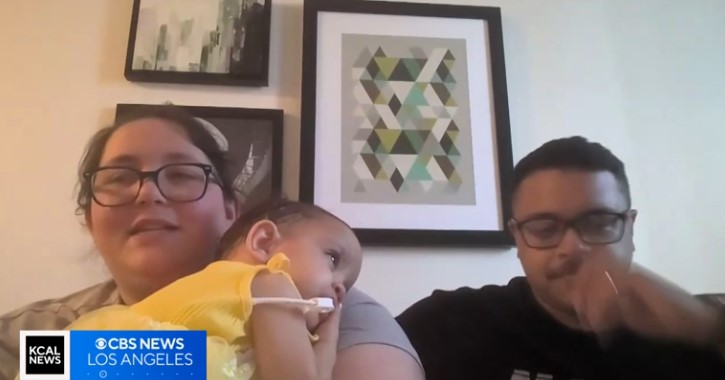Baby gets life-saving implant after isolating for a year

By Laurie Perez, Matthew Rodriguez
Click here for updates on this story
California (KCAL, KCBS) — After 13 months of isolation, a baby from Los Angeles County received the potentially life-saving implant that could kick-start her immune system and allow her to live a semi-regular life.
Since the birth of their daughter, Syanne, the Landrons have quarantined themselves inside their Santa Clarita home to protect their baby, who was born without a thymus gland. Lacking an essential part of her immune system, any exposure to germs or infections could be deadly for Syanne.
The diagnosis changed the way they lived. They’ve celebrated holidays and birthdays from afar while family and friends drop off deliveries of food and supplies.
“We don’t see anybody,” mother Marilyn Landron said. “There is no six feet apart. You don’t go near anybody. We wear a mask anywhere and everywhere. Even if we’re going to the trash, we put a mask on … We don’t go to stores. We couldn’t even do our own laundry for a good minute at our old apartment.”
Most children without a thymus gland don’t survive past their first birthday, according to Duke University. However, in 2021, doctors from the university’s medical center received FDA approval to begin their pioneering thymus implant procedure. In August, doctors from Duke invited the Landrons to visit North Carolina so Syanne could be the 52nd person to receive the potentially life-saving operation.
For their trip to North Carolina, the Landrons took special precautions to prevent exposure, including ambulances and a private medical jet.
“I handed her over, and I think that was probably the hardest part. I cried,” Marilyn Landron said.
After the medical team took their daughter into their care, the family waited in anxious excitement as surgeons implanted tissue from another baby into Syanne. Friends and family rejoiced when doctors told them they had successfully completed the procedure.
“Since getting the call, since coming out here, and her getting her surgery, there’s finally a light at the end,” father Alex Landron said.
The Landrons said that the $3 million procedure has a 70% success rate, which increases over time. When they return home, they will still have to isolate themselves for at least six months as Syanne’s immune system develops. After that, Syanne will still be immunocompromised and experience more severe symptoms from the common cold compared to others, but in the end, she’ll have a better chance at surviving.
“Her immune system will always be a little weaker than everyone else’s,” Alex Landron said. “Sicknesses will hit her harder than regular people, but she’ll live.”
Please note: This content carries a strict local market embargo. If you share the same market as the contributor of this article, you may not use it on any platform.